P1 Different types of entrepreneurial ventures and explain how they relate to the typology
VerifiedAdded on 2021/02/19
|13
|3631
|115
AI Summary
Contribute Materials
Your contribution can guide someone’s learning journey. Share your
documents today.

ENTREPRENERUSHIP
Secure Best Marks with AI Grader
Need help grading? Try our AI Grader for instant feedback on your assignments.
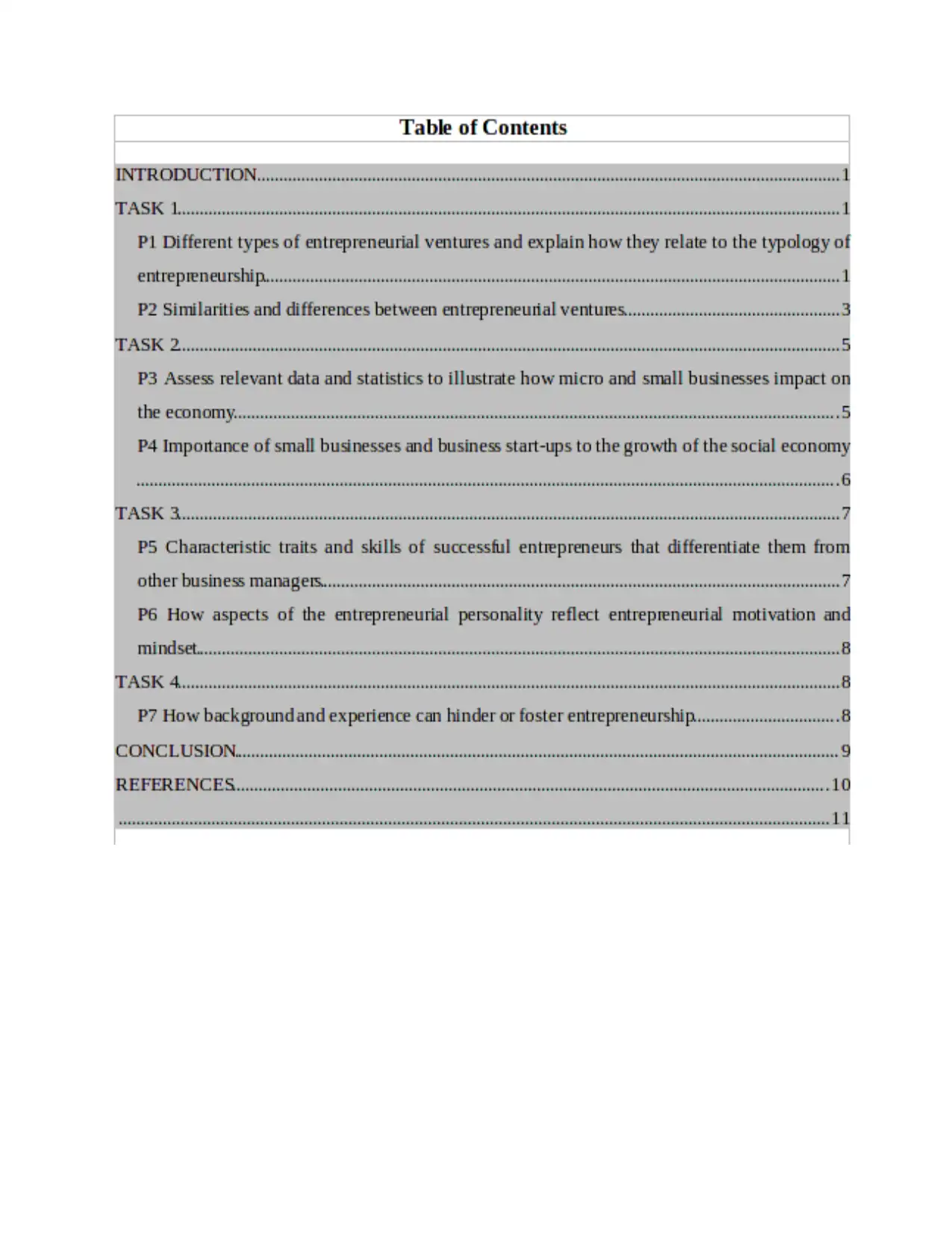
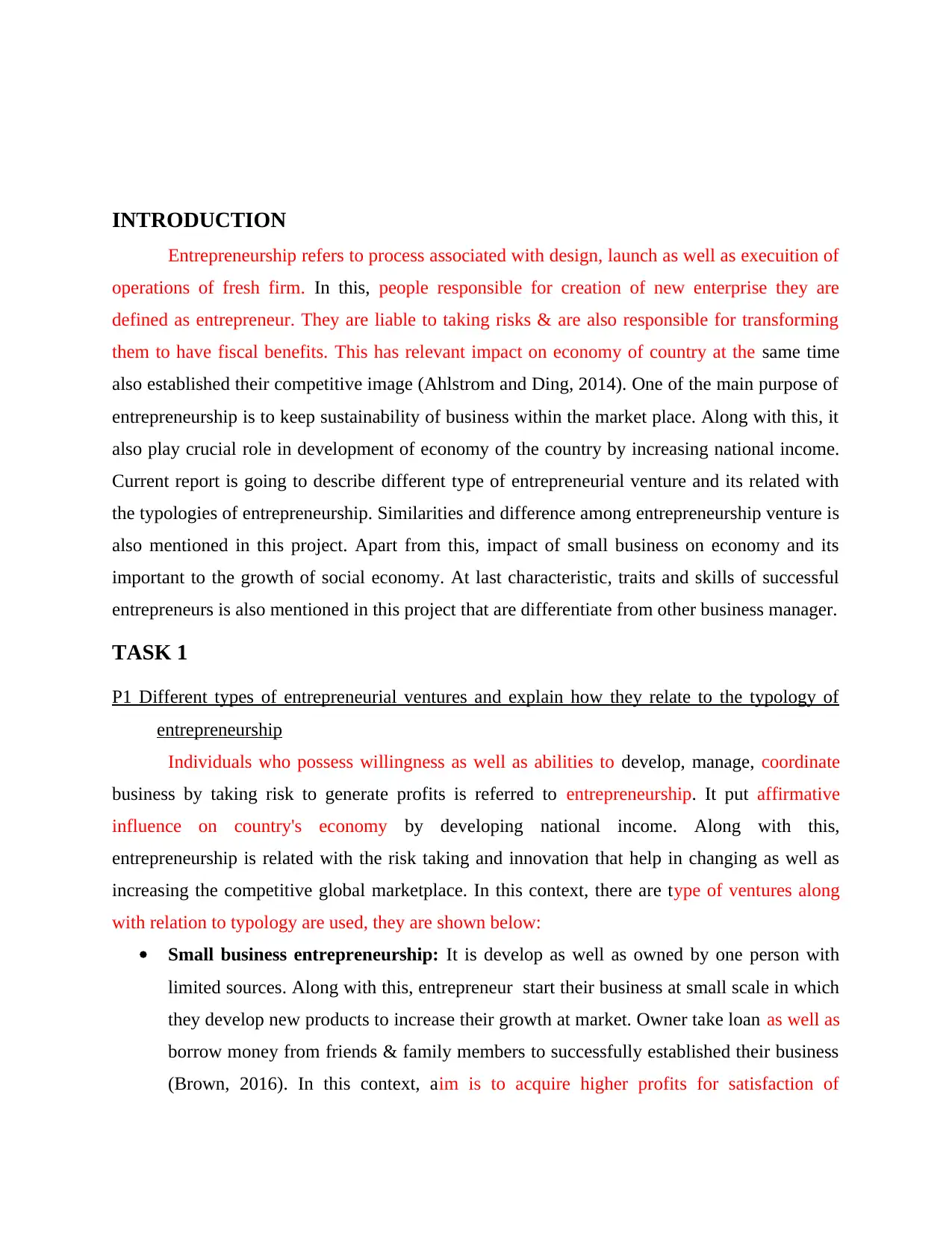
INTRODUCTION
Entrepreneurship refers to process associated with design, launch as well as execuition of
operations of fresh firm. In this, people responsible for creation of new enterprise they are
defined as entrepreneur. They are liable to taking risks & are also responsible for transforming
them to have fiscal benefits. This has relevant impact on economy of country at the same time
also established their competitive image (Ahlstrom and Ding, 2014). One of the main purpose of
entrepreneurship is to keep sustainability of business within the market place. Along with this, it
also play crucial role in development of economy of the country by increasing national income.
Current report is going to describe different type of entrepreneurial venture and its related with
the typologies of entrepreneurship. Similarities and difference among entrepreneurship venture is
also mentioned in this project. Apart from this, impact of small business on economy and its
important to the growth of social economy. At last characteristic, traits and skills of successful
entrepreneurs is also mentioned in this project that are differentiate from other business manager.
TASK 1
P1 Different types of entrepreneurial ventures and explain how they relate to the typology of
entrepreneurship
Individuals who possess willingness as well as abilities to develop, manage, coordinate
business by taking risk to generate profits is referred to entrepreneurship. It put affirmative
influence on country's economy by developing national income. Along with this,
entrepreneurship is related with the risk taking and innovation that help in changing as well as
increasing the competitive global marketplace. In this context, there are type of ventures along
with relation to typology are used, they are shown below:
Small business entrepreneurship: It is develop as well as owned by one person with
limited sources. Along with this, entrepreneur start their business at small scale in which
they develop new products to increase their growth at market. Owner take loan as well as
borrow money from friends & family members to successfully established their business
(Brown, 2016). In this context, aim is to acquire higher profits for satisfaction of
Entrepreneurship refers to process associated with design, launch as well as execuition of
operations of fresh firm. In this, people responsible for creation of new enterprise they are
defined as entrepreneur. They are liable to taking risks & are also responsible for transforming
them to have fiscal benefits. This has relevant impact on economy of country at the same time
also established their competitive image (Ahlstrom and Ding, 2014). One of the main purpose of
entrepreneurship is to keep sustainability of business within the market place. Along with this, it
also play crucial role in development of economy of the country by increasing national income.
Current report is going to describe different type of entrepreneurial venture and its related with
the typologies of entrepreneurship. Similarities and difference among entrepreneurship venture is
also mentioned in this project. Apart from this, impact of small business on economy and its
important to the growth of social economy. At last characteristic, traits and skills of successful
entrepreneurs is also mentioned in this project that are differentiate from other business manager.
TASK 1
P1 Different types of entrepreneurial ventures and explain how they relate to the typology of
entrepreneurship
Individuals who possess willingness as well as abilities to develop, manage, coordinate
business by taking risk to generate profits is referred to entrepreneurship. It put affirmative
influence on country's economy by developing national income. Along with this,
entrepreneurship is related with the risk taking and innovation that help in changing as well as
increasing the competitive global marketplace. In this context, there are type of ventures along
with relation to typology are used, they are shown below:
Small business entrepreneurship: It is develop as well as owned by one person with
limited sources. Along with this, entrepreneur start their business at small scale in which
they develop new products to increase their growth at market. Owner take loan as well as
borrow money from friends & family members to successfully established their business
(Brown, 2016). In this context, aim is to acquire higher profits for satisfaction of
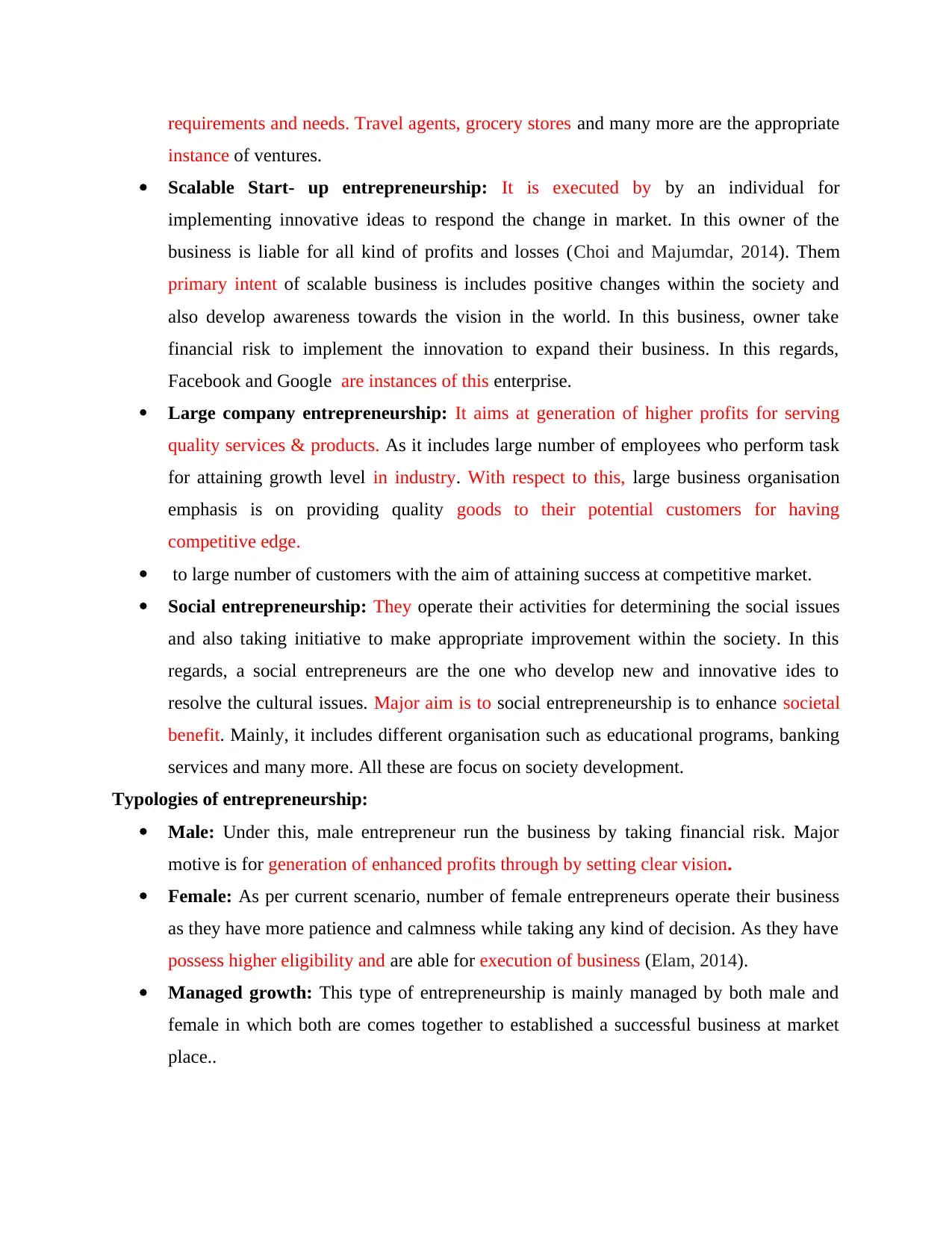
requirements and needs. Travel agents, grocery stores and many more are the appropriate
instance of ventures.
Scalable Start- up entrepreneurship: It is executed by by an individual for
implementing innovative ideas to respond the change in market. In this owner of the
business is liable for all kind of profits and losses (Choi and Majumdar, 2014). Them
primary intent of scalable business is includes positive changes within the society and
also develop awareness towards the vision in the world. In this business, owner take
financial risk to implement the innovation to expand their business. In this regards,
Facebook and Google are instances of this enterprise.
Large company entrepreneurship: It aims at generation of higher profits for serving
quality services & products. As it includes large number of employees who perform task
for attaining growth level in industry. With respect to this, large business organisation
emphasis is on providing quality goods to their potential customers for having
competitive edge.
to large number of customers with the aim of attaining success at competitive market.
Social entrepreneurship: They operate their activities for determining the social issues
and also taking initiative to make appropriate improvement within the society. In this
regards, a social entrepreneurs are the one who develop new and innovative ides to
resolve the cultural issues. Major aim is to social entrepreneurship is to enhance societal
benefit. Mainly, it includes different organisation such as educational programs, banking
services and many more. All these are focus on society development.
Typologies of entrepreneurship:
Male: Under this, male entrepreneur run the business by taking financial risk. Major
motive is for generation of enhanced profits through by setting clear vision.
Female: As per current scenario, number of female entrepreneurs operate their business
as they have more patience and calmness while taking any kind of decision. As they have
possess higher eligibility and are able for execution of business (Elam, 2014).
Managed growth: This type of entrepreneurship is mainly managed by both male and
female in which both are comes together to established a successful business at market
place..
instance of ventures.
Scalable Start- up entrepreneurship: It is executed by by an individual for
implementing innovative ideas to respond the change in market. In this owner of the
business is liable for all kind of profits and losses (Choi and Majumdar, 2014). Them
primary intent of scalable business is includes positive changes within the society and
also develop awareness towards the vision in the world. In this business, owner take
financial risk to implement the innovation to expand their business. In this regards,
Facebook and Google are instances of this enterprise.
Large company entrepreneurship: It aims at generation of higher profits for serving
quality services & products. As it includes large number of employees who perform task
for attaining growth level in industry. With respect to this, large business organisation
emphasis is on providing quality goods to their potential customers for having
competitive edge.
to large number of customers with the aim of attaining success at competitive market.
Social entrepreneurship: They operate their activities for determining the social issues
and also taking initiative to make appropriate improvement within the society. In this
regards, a social entrepreneurs are the one who develop new and innovative ides to
resolve the cultural issues. Major aim is to social entrepreneurship is to enhance societal
benefit. Mainly, it includes different organisation such as educational programs, banking
services and many more. All these are focus on society development.
Typologies of entrepreneurship:
Male: Under this, male entrepreneur run the business by taking financial risk. Major
motive is for generation of enhanced profits through by setting clear vision.
Female: As per current scenario, number of female entrepreneurs operate their business
as they have more patience and calmness while taking any kind of decision. As they have
possess higher eligibility and are able for execution of business (Elam, 2014).
Managed growth: This type of entrepreneurship is mainly managed by both male and
female in which both are comes together to established a successful business at market
place..
Secure Best Marks with AI Grader
Need help grading? Try our AI Grader for instant feedback on your assignments.
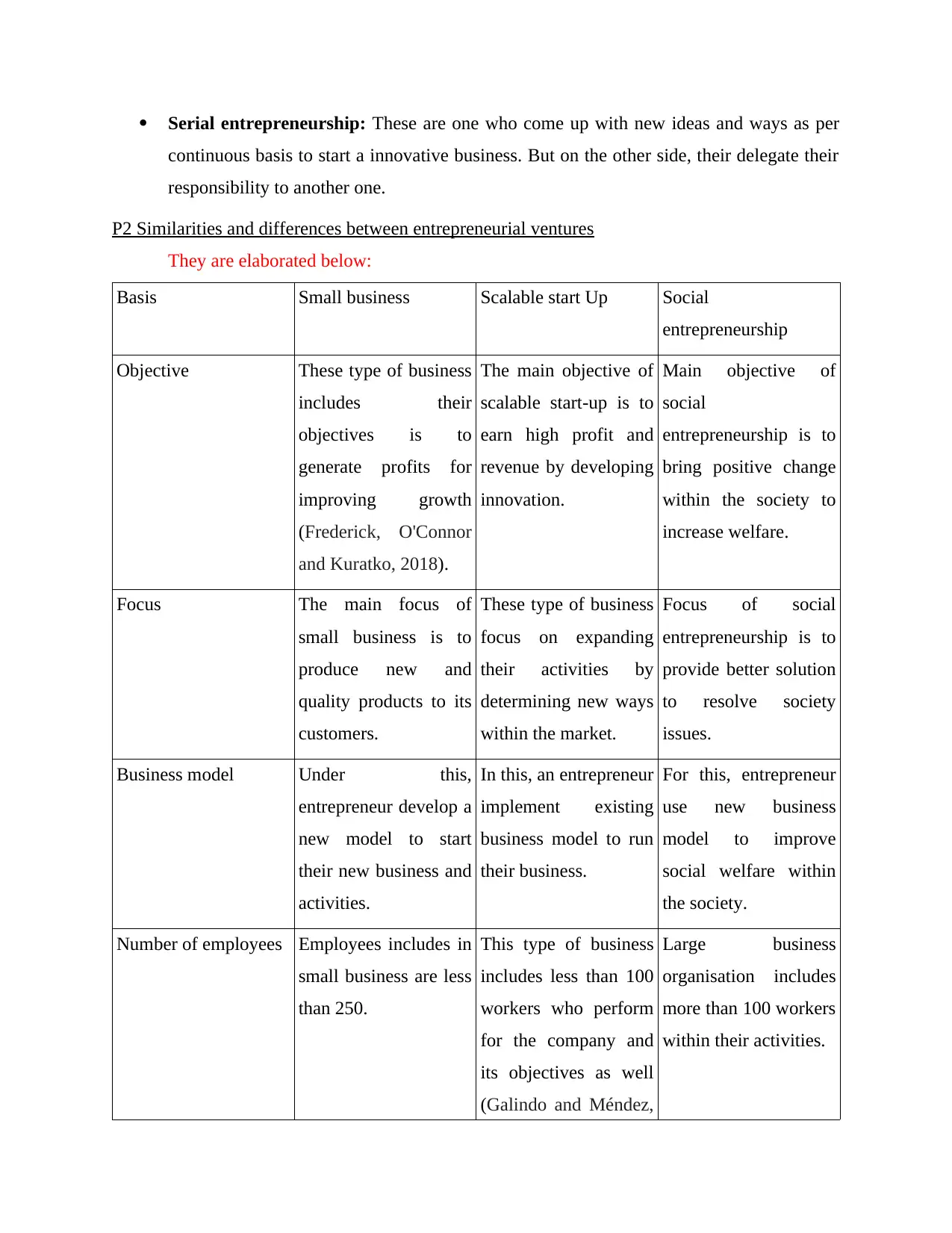
Serial entrepreneurship: These are one who come up with new ideas and ways as per
continuous basis to start a innovative business. But on the other side, their delegate their
responsibility to another one.
P2 Similarities and differences between entrepreneurial ventures
They are elaborated below:
Basis Small business Scalable start Up Social
entrepreneurship
Objective These type of business
includes their
objectives is to
generate profits for
improving growth
(Frederick, O'Connor
and Kuratko, 2018).
The main objective of
scalable start-up is to
earn high profit and
revenue by developing
innovation.
Main objective of
social
entrepreneurship is to
bring positive change
within the society to
increase welfare.
Focus The main focus of
small business is to
produce new and
quality products to its
customers.
These type of business
focus on expanding
their activities by
determining new ways
within the market.
Focus of social
entrepreneurship is to
provide better solution
to resolve society
issues.
Business model Under this,
entrepreneur develop a
new model to start
their new business and
activities.
In this, an entrepreneur
implement existing
business model to run
their business.
For this, entrepreneur
use new business
model to improve
social welfare within
the society.
Number of employees Employees includes in
small business are less
than 250.
This type of business
includes less than 100
workers who perform
for the company and
its objectives as well
(Galindo and Méndez,
Large business
organisation includes
more than 100 workers
within their activities.
continuous basis to start a innovative business. But on the other side, their delegate their
responsibility to another one.
P2 Similarities and differences between entrepreneurial ventures
They are elaborated below:
Basis Small business Scalable start Up Social
entrepreneurship
Objective These type of business
includes their
objectives is to
generate profits for
improving growth
(Frederick, O'Connor
and Kuratko, 2018).
The main objective of
scalable start-up is to
earn high profit and
revenue by developing
innovation.
Main objective of
social
entrepreneurship is to
bring positive change
within the society to
increase welfare.
Focus The main focus of
small business is to
produce new and
quality products to its
customers.
These type of business
focus on expanding
their activities by
determining new ways
within the market.
Focus of social
entrepreneurship is to
provide better solution
to resolve society
issues.
Business model Under this,
entrepreneur develop a
new model to start
their new business and
activities.
In this, an entrepreneur
implement existing
business model to run
their business.
For this, entrepreneur
use new business
model to improve
social welfare within
the society.
Number of employees Employees includes in
small business are less
than 250.
This type of business
includes less than 100
workers who perform
for the company and
its objectives as well
(Galindo and Méndez,
Large business
organisation includes
more than 100 workers
within their activities.
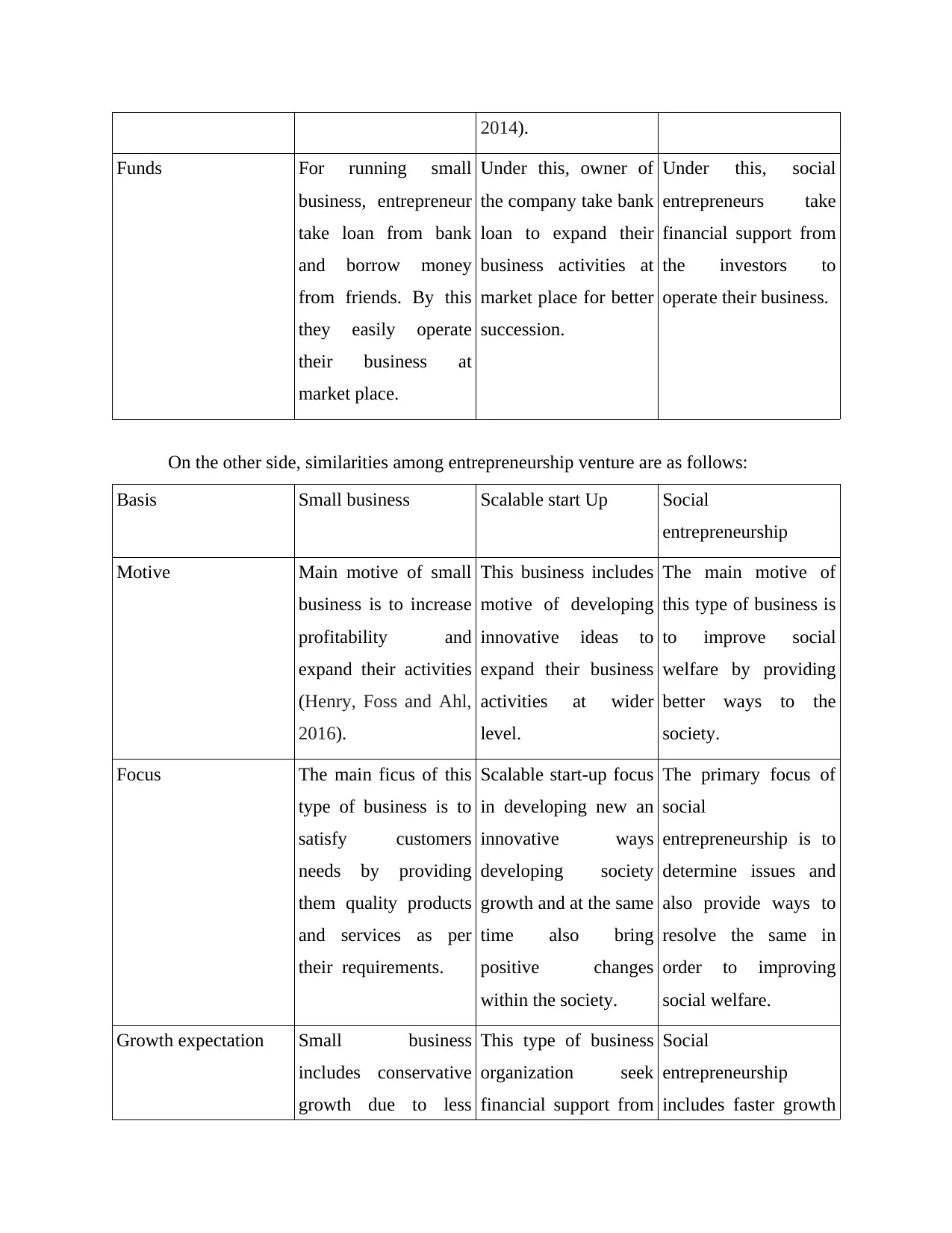
2014).
Funds For running small
business, entrepreneur
take loan from bank
and borrow money
from friends. By this
they easily operate
their business at
market place.
Under this, owner of
the company take bank
loan to expand their
business activities at
market place for better
succession.
Under this, social
entrepreneurs take
financial support from
the investors to
operate their business.
On the other side, similarities among entrepreneurship venture are as follows:
Basis Small business Scalable start Up Social
entrepreneurship
Motive Main motive of small
business is to increase
profitability and
expand their activities
(Henry, Foss and Ahl,
2016).
This business includes
motive of developing
innovative ideas to
expand their business
activities at wider
level.
The main motive of
this type of business is
to improve social
welfare by providing
better ways to the
society.
Focus The main ficus of this
type of business is to
satisfy customers
needs by providing
them quality products
and services as per
their requirements.
Scalable start-up focus
in developing new an
innovative ways
developing society
growth and at the same
time also bring
positive changes
within the society.
The primary focus of
social
entrepreneurship is to
determine issues and
also provide ways to
resolve the same in
order to improving
social welfare.
Growth expectation Small business
includes conservative
growth due to less
This type of business
organization seek
financial support from
Social
entrepreneurship
includes faster growth
Funds For running small
business, entrepreneur
take loan from bank
and borrow money
from friends. By this
they easily operate
their business at
market place.
Under this, owner of
the company take bank
loan to expand their
business activities at
market place for better
succession.
Under this, social
entrepreneurs take
financial support from
the investors to
operate their business.
On the other side, similarities among entrepreneurship venture are as follows:
Basis Small business Scalable start Up Social
entrepreneurship
Motive Main motive of small
business is to increase
profitability and
expand their activities
(Henry, Foss and Ahl,
2016).
This business includes
motive of developing
innovative ideas to
expand their business
activities at wider
level.
The main motive of
this type of business is
to improve social
welfare by providing
better ways to the
society.
Focus The main ficus of this
type of business is to
satisfy customers
needs by providing
them quality products
and services as per
their requirements.
Scalable start-up focus
in developing new an
innovative ways
developing society
growth and at the same
time also bring
positive changes
within the society.
The primary focus of
social
entrepreneurship is to
determine issues and
also provide ways to
resolve the same in
order to improving
social welfare.
Growth expectation Small business
includes conservative
growth due to less
This type of business
organization seek
financial support from
Social
entrepreneurship
includes faster growth
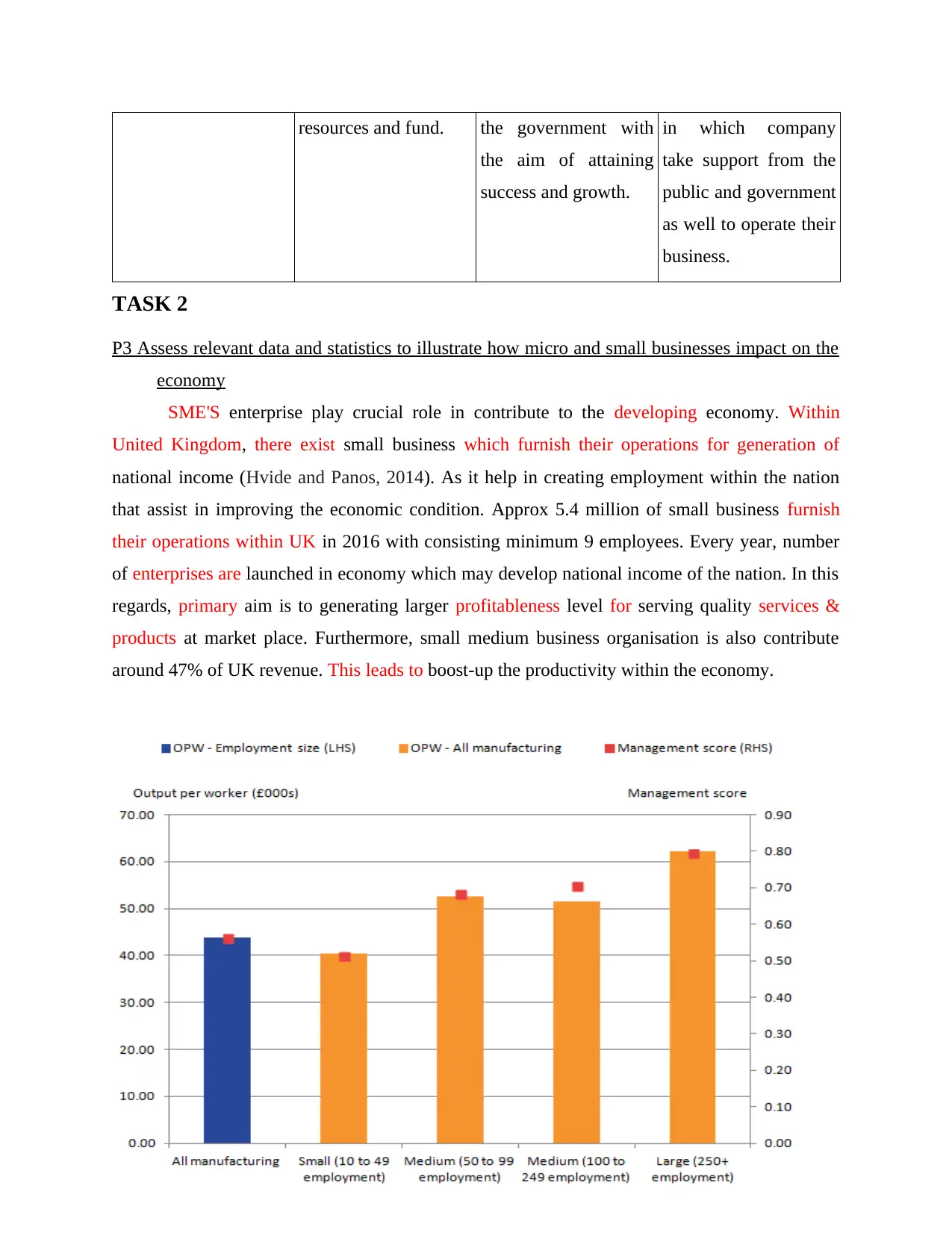
resources and fund. the government with
the aim of attaining
success and growth.
in which company
take support from the
public and government
as well to operate their
business.
TASK 2
P3 Assess relevant data and statistics to illustrate how micro and small businesses impact on the
economy
SME'S enterprise play crucial role in contribute to the developing economy. Within
United Kingdom, there exist small business which furnish their operations for generation of
national income (Hvide and Panos, 2014). As it help in creating employment within the nation
that assist in improving the economic condition. Approx 5.4 million of small business furnish
their operations within UK in 2016 with consisting minimum 9 employees. Every year, number
of enterprises are launched in economy which may develop national income of the nation. In this
regards, primary aim is to generating larger profitableness level for serving quality services &
products at market place. Furthermore, small medium business organisation is also contribute
around 47% of UK revenue. This leads to boost-up the productivity within the economy.
the aim of attaining
success and growth.
in which company
take support from the
public and government
as well to operate their
business.
TASK 2
P3 Assess relevant data and statistics to illustrate how micro and small businesses impact on the
economy
SME'S enterprise play crucial role in contribute to the developing economy. Within
United Kingdom, there exist small business which furnish their operations for generation of
national income (Hvide and Panos, 2014). As it help in creating employment within the nation
that assist in improving the economic condition. Approx 5.4 million of small business furnish
their operations within UK in 2016 with consisting minimum 9 employees. Every year, number
of enterprises are launched in economy which may develop national income of the nation. In this
regards, primary aim is to generating larger profitableness level for serving quality services &
products at market place. Furthermore, small medium business organisation is also contribute
around 47% of UK revenue. This leads to boost-up the productivity within the economy.
Paraphrase This Document
Need a fresh take? Get an instant paraphrase of this document with our AI Paraphraser
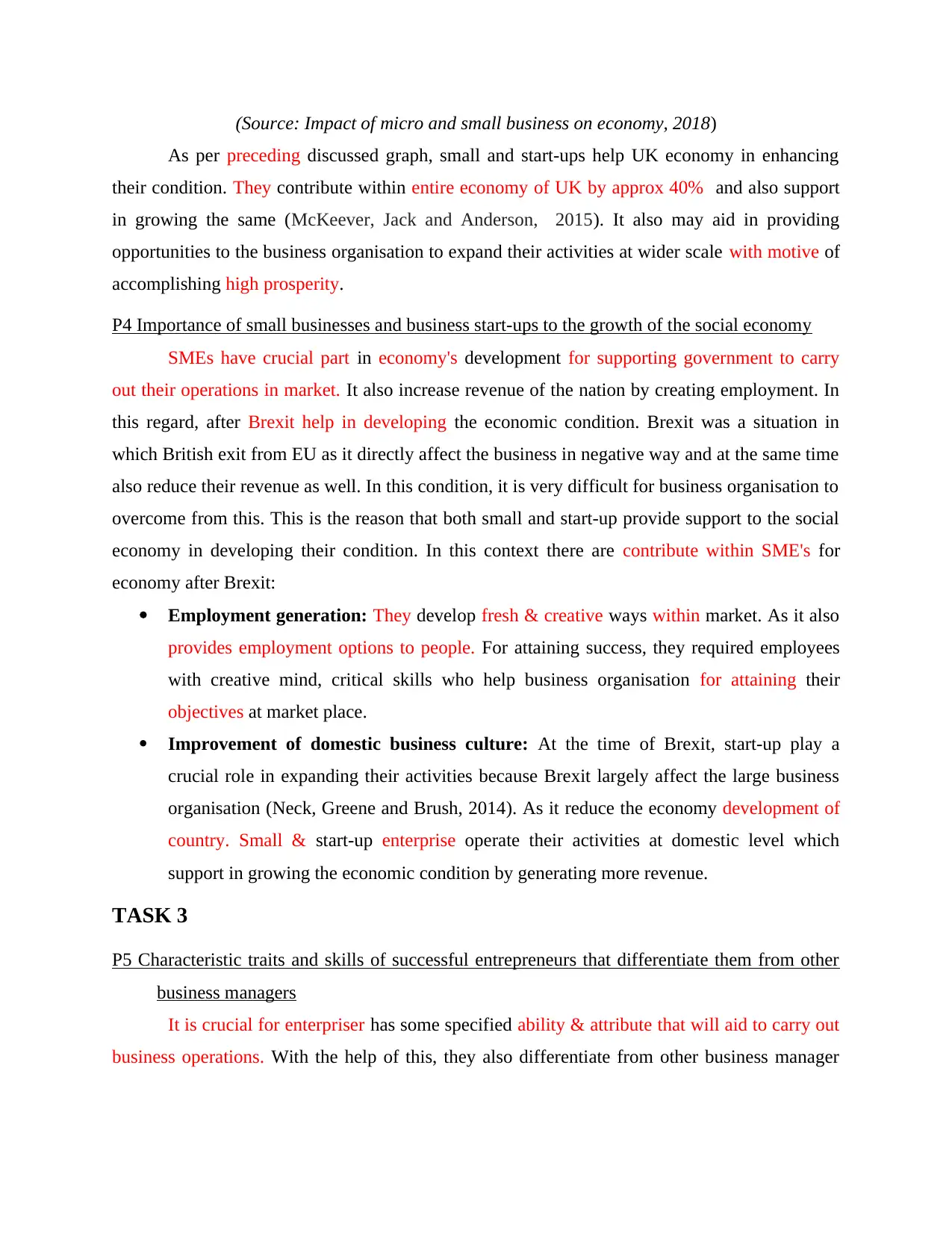
(Source: Impact of micro and small business on economy, 2018)
As per preceding discussed graph, small and start-ups help UK economy in enhancing
their condition. They contribute within entire economy of UK by approx 40% and also support
in growing the same (McKeever, Jack and Anderson, 2015). It also may aid in providing
opportunities to the business organisation to expand their activities at wider scale with motive of
accomplishing high prosperity.
P4 Importance of small businesses and business start-ups to the growth of the social economy
SMEs have crucial part in economy's development for supporting government to carry
out their operations in market. It also increase revenue of the nation by creating employment. In
this regard, after Brexit help in developing the economic condition. Brexit was a situation in
which British exit from EU as it directly affect the business in negative way and at the same time
also reduce their revenue as well. In this condition, it is very difficult for business organisation to
overcome from this. This is the reason that both small and start-up provide support to the social
economy in developing their condition. In this context there are contribute within SME's for
economy after Brexit:
Employment generation: They develop fresh & creative ways within market. As it also
provides employment options to people. For attaining success, they required employees
with creative mind, critical skills who help business organisation for attaining their
objectives at market place.
Improvement of domestic business culture: At the time of Brexit, start-up play a
crucial role in expanding their activities because Brexit largely affect the large business
organisation (Neck, Greene and Brush, 2014). As it reduce the economy development of
country. Small & start-up enterprise operate their activities at domestic level which
support in growing the economic condition by generating more revenue.
TASK 3
P5 Characteristic traits and skills of successful entrepreneurs that differentiate them from other
business managers
It is crucial for enterpriser has some specified ability & attribute that will aid to carry out
business operations. With the help of this, they also differentiate from other business manager
As per preceding discussed graph, small and start-ups help UK economy in enhancing
their condition. They contribute within entire economy of UK by approx 40% and also support
in growing the same (McKeever, Jack and Anderson, 2015). It also may aid in providing
opportunities to the business organisation to expand their activities at wider scale with motive of
accomplishing high prosperity.
P4 Importance of small businesses and business start-ups to the growth of the social economy
SMEs have crucial part in economy's development for supporting government to carry
out their operations in market. It also increase revenue of the nation by creating employment. In
this regard, after Brexit help in developing the economic condition. Brexit was a situation in
which British exit from EU as it directly affect the business in negative way and at the same time
also reduce their revenue as well. In this condition, it is very difficult for business organisation to
overcome from this. This is the reason that both small and start-up provide support to the social
economy in developing their condition. In this context there are contribute within SME's for
economy after Brexit:
Employment generation: They develop fresh & creative ways within market. As it also
provides employment options to people. For attaining success, they required employees
with creative mind, critical skills who help business organisation for attaining their
objectives at market place.
Improvement of domestic business culture: At the time of Brexit, start-up play a
crucial role in expanding their activities because Brexit largely affect the large business
organisation (Neck, Greene and Brush, 2014). As it reduce the economy development of
country. Small & start-up enterprise operate their activities at domestic level which
support in growing the economic condition by generating more revenue.
TASK 3
P5 Characteristic traits and skills of successful entrepreneurs that differentiate them from other
business managers
It is crucial for enterpriser has some specified ability & attribute that will aid to carry out
business operations. With the help of this, they also differentiate from other business manager
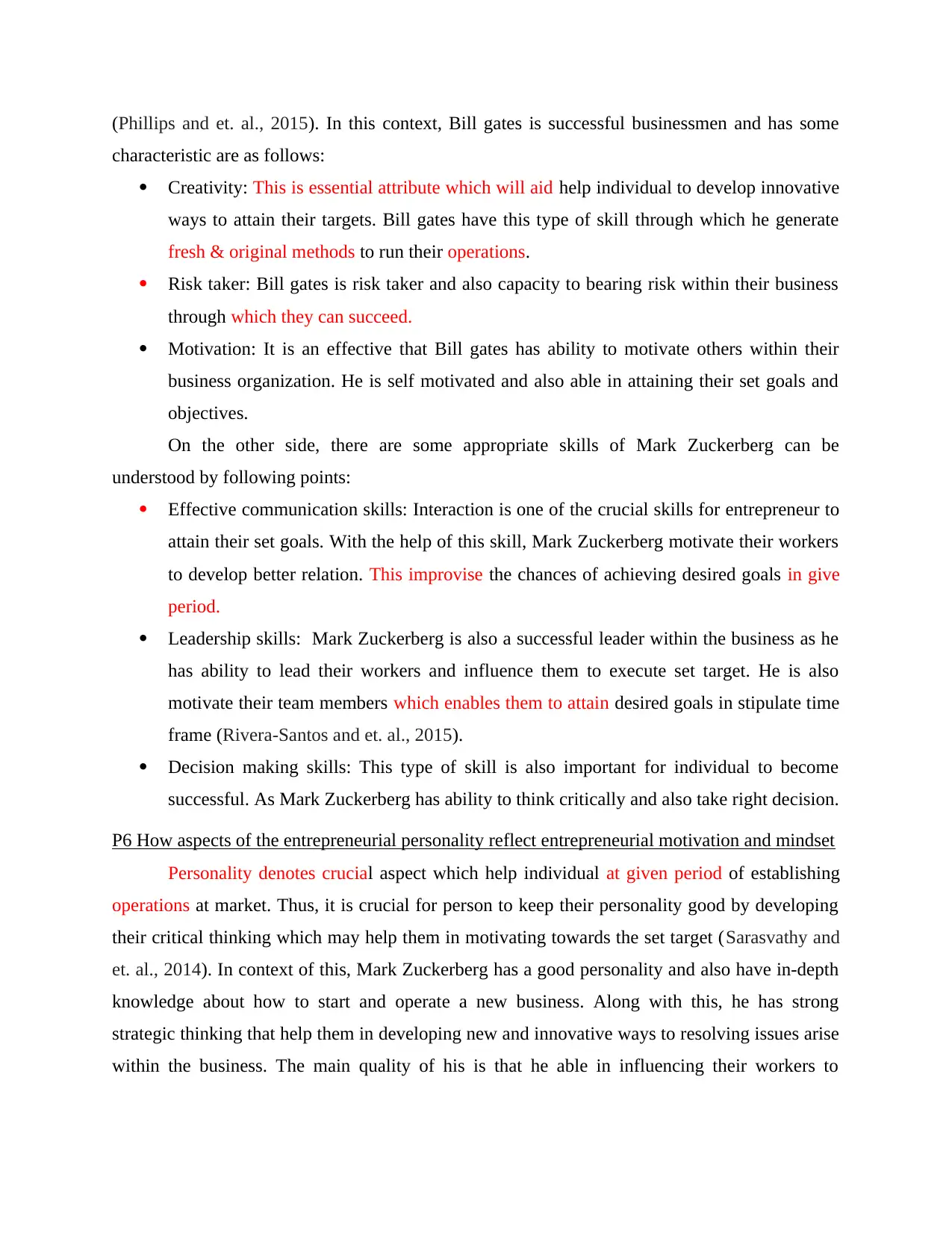
(Phillips and et. al., 2015). In this context, Bill gates is successful businessmen and has some
characteristic are as follows:
Creativity: This is essential attribute which will aid help individual to develop innovative
ways to attain their targets. Bill gates have this type of skill through which he generate
fresh & original methods to run their operations.
Risk taker: Bill gates is risk taker and also capacity to bearing risk within their business
through which they can succeed.
Motivation: It is an effective that Bill gates has ability to motivate others within their
business organization. He is self motivated and also able in attaining their set goals and
objectives.
On the other side, there are some appropriate skills of Mark Zuckerberg can be
understood by following points:
Effective communication skills: Interaction is one of the crucial skills for entrepreneur to
attain their set goals. With the help of this skill, Mark Zuckerberg motivate their workers
to develop better relation. This improvise the chances of achieving desired goals in give
period.
Leadership skills: Mark Zuckerberg is also a successful leader within the business as he
has ability to lead their workers and influence them to execute set target. He is also
motivate their team members which enables them to attain desired goals in stipulate time
frame (Rivera-Santos and et. al., 2015).
Decision making skills: This type of skill is also important for individual to become
successful. As Mark Zuckerberg has ability to think critically and also take right decision.
P6 How aspects of the entrepreneurial personality reflect entrepreneurial motivation and mindset
Personality denotes crucial aspect which help individual at given period of establishing
operations at market. Thus, it is crucial for person to keep their personality good by developing
their critical thinking which may help them in motivating towards the set target (Sarasvathy and
et. al., 2014). In context of this, Mark Zuckerberg has a good personality and also have in-depth
knowledge about how to start and operate a new business. Along with this, he has strong
strategic thinking that help them in developing new and innovative ways to resolving issues arise
within the business. The main quality of his is that he able in influencing their workers to
characteristic are as follows:
Creativity: This is essential attribute which will aid help individual to develop innovative
ways to attain their targets. Bill gates have this type of skill through which he generate
fresh & original methods to run their operations.
Risk taker: Bill gates is risk taker and also capacity to bearing risk within their business
through which they can succeed.
Motivation: It is an effective that Bill gates has ability to motivate others within their
business organization. He is self motivated and also able in attaining their set goals and
objectives.
On the other side, there are some appropriate skills of Mark Zuckerberg can be
understood by following points:
Effective communication skills: Interaction is one of the crucial skills for entrepreneur to
attain their set goals. With the help of this skill, Mark Zuckerberg motivate their workers
to develop better relation. This improvise the chances of achieving desired goals in give
period.
Leadership skills: Mark Zuckerberg is also a successful leader within the business as he
has ability to lead their workers and influence them to execute set target. He is also
motivate their team members which enables them to attain desired goals in stipulate time
frame (Rivera-Santos and et. al., 2015).
Decision making skills: This type of skill is also important for individual to become
successful. As Mark Zuckerberg has ability to think critically and also take right decision.
P6 How aspects of the entrepreneurial personality reflect entrepreneurial motivation and mindset
Personality denotes crucial aspect which help individual at given period of establishing
operations at market. Thus, it is crucial for person to keep their personality good by developing
their critical thinking which may help them in motivating towards the set target (Sarasvathy and
et. al., 2014). In context of this, Mark Zuckerberg has a good personality and also have in-depth
knowledge about how to start and operate a new business. Along with this, he has strong
strategic thinking that help them in developing new and innovative ways to resolving issues arise
within the business. The main quality of his is that he able in influencing their workers to
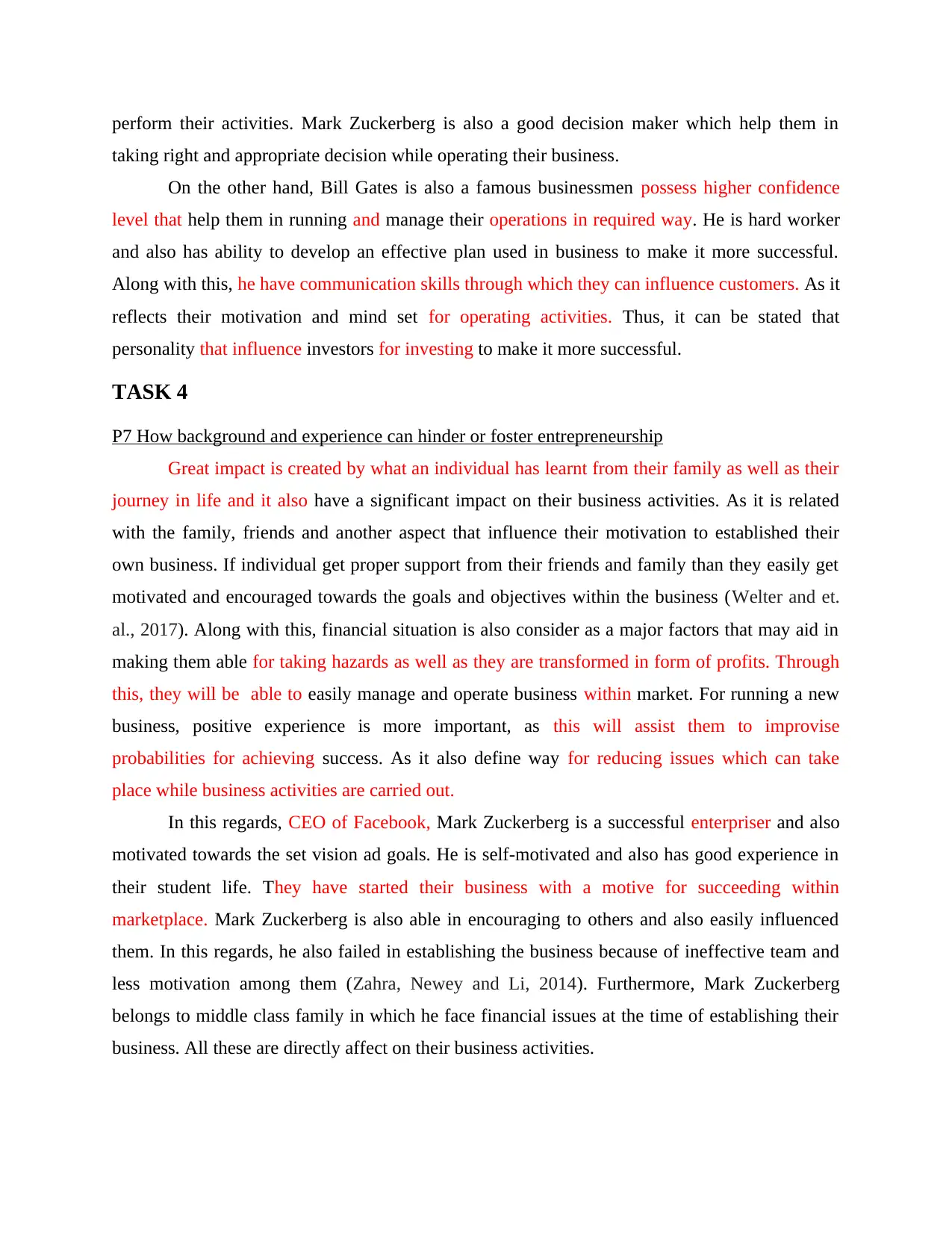
perform their activities. Mark Zuckerberg is also a good decision maker which help them in
taking right and appropriate decision while operating their business.
On the other hand, Bill Gates is also a famous businessmen possess higher confidence
level that help them in running and manage their operations in required way. He is hard worker
and also has ability to develop an effective plan used in business to make it more successful.
Along with this, he have communication skills through which they can influence customers. As it
reflects their motivation and mind set for operating activities. Thus, it can be stated that
personality that influence investors for investing to make it more successful.
TASK 4
P7 How background and experience can hinder or foster entrepreneurship
Great impact is created by what an individual has learnt from their family as well as their
journey in life and it also have a significant impact on their business activities. As it is related
with the family, friends and another aspect that influence their motivation to established their
own business. If individual get proper support from their friends and family than they easily get
motivated and encouraged towards the goals and objectives within the business (Welter and et.
al., 2017). Along with this, financial situation is also consider as a major factors that may aid in
making them able for taking hazards as well as they are transformed in form of profits. Through
this, they will be able to easily manage and operate business within market. For running a new
business, positive experience is more important, as this will assist them to improvise
probabilities for achieving success. As it also define way for reducing issues which can take
place while business activities are carried out.
In this regards, CEO of Facebook, Mark Zuckerberg is a successful enterpriser and also
motivated towards the set vision ad goals. He is self-motivated and also has good experience in
their student life. They have started their business with a motive for succeeding within
marketplace. Mark Zuckerberg is also able in encouraging to others and also easily influenced
them. In this regards, he also failed in establishing the business because of ineffective team and
less motivation among them (Zahra, Newey and Li, 2014). Furthermore, Mark Zuckerberg
belongs to middle class family in which he face financial issues at the time of establishing their
business. All these are directly affect on their business activities.
taking right and appropriate decision while operating their business.
On the other hand, Bill Gates is also a famous businessmen possess higher confidence
level that help them in running and manage their operations in required way. He is hard worker
and also has ability to develop an effective plan used in business to make it more successful.
Along with this, he have communication skills through which they can influence customers. As it
reflects their motivation and mind set for operating activities. Thus, it can be stated that
personality that influence investors for investing to make it more successful.
TASK 4
P7 How background and experience can hinder or foster entrepreneurship
Great impact is created by what an individual has learnt from their family as well as their
journey in life and it also have a significant impact on their business activities. As it is related
with the family, friends and another aspect that influence their motivation to established their
own business. If individual get proper support from their friends and family than they easily get
motivated and encouraged towards the goals and objectives within the business (Welter and et.
al., 2017). Along with this, financial situation is also consider as a major factors that may aid in
making them able for taking hazards as well as they are transformed in form of profits. Through
this, they will be able to easily manage and operate business within market. For running a new
business, positive experience is more important, as this will assist them to improvise
probabilities for achieving success. As it also define way for reducing issues which can take
place while business activities are carried out.
In this regards, CEO of Facebook, Mark Zuckerberg is a successful enterpriser and also
motivated towards the set vision ad goals. He is self-motivated and also has good experience in
their student life. They have started their business with a motive for succeeding within
marketplace. Mark Zuckerberg is also able in encouraging to others and also easily influenced
them. In this regards, he also failed in establishing the business because of ineffective team and
less motivation among them (Zahra, Newey and Li, 2014). Furthermore, Mark Zuckerberg
belongs to middle class family in which he face financial issues at the time of establishing their
business. All these are directly affect on their business activities.
Secure Best Marks with AI Grader
Need help grading? Try our AI Grader for instant feedback on your assignments.
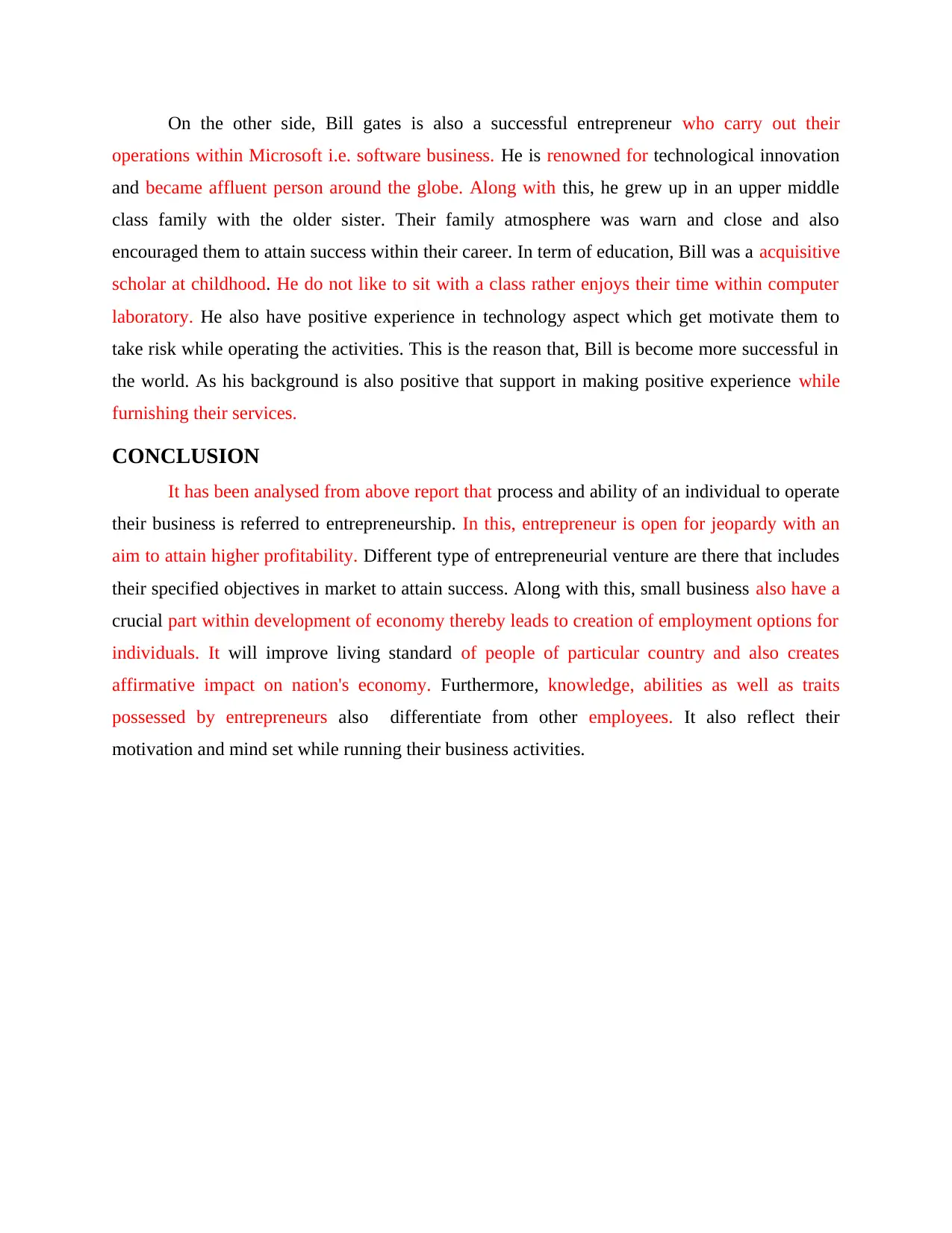
On the other side, Bill gates is also a successful entrepreneur who carry out their
operations within Microsoft i.e. software business. He is renowned for technological innovation
and became affluent person around the globe. Along with this, he grew up in an upper middle
class family with the older sister. Their family atmosphere was warn and close and also
encouraged them to attain success within their career. In term of education, Bill was a acquisitive
scholar at childhood. He do not like to sit with a class rather enjoys their time within computer
laboratory. He also have positive experience in technology aspect which get motivate them to
take risk while operating the activities. This is the reason that, Bill is become more successful in
the world. As his background is also positive that support in making positive experience while
furnishing their services.
CONCLUSION
It has been analysed from above report that process and ability of an individual to operate
their business is referred to entrepreneurship. In this, entrepreneur is open for jeopardy with an
aim to attain higher profitability. Different type of entrepreneurial venture are there that includes
their specified objectives in market to attain success. Along with this, small business also have a
crucial part within development of economy thereby leads to creation of employment options for
individuals. It will improve living standard of people of particular country and also creates
affirmative impact on nation's economy. Furthermore, knowledge, abilities as well as traits
possessed by entrepreneurs also differentiate from other employees. It also reflect their
motivation and mind set while running their business activities.
operations within Microsoft i.e. software business. He is renowned for technological innovation
and became affluent person around the globe. Along with this, he grew up in an upper middle
class family with the older sister. Their family atmosphere was warn and close and also
encouraged them to attain success within their career. In term of education, Bill was a acquisitive
scholar at childhood. He do not like to sit with a class rather enjoys their time within computer
laboratory. He also have positive experience in technology aspect which get motivate them to
take risk while operating the activities. This is the reason that, Bill is become more successful in
the world. As his background is also positive that support in making positive experience while
furnishing their services.
CONCLUSION
It has been analysed from above report that process and ability of an individual to operate
their business is referred to entrepreneurship. In this, entrepreneur is open for jeopardy with an
aim to attain higher profitability. Different type of entrepreneurial venture are there that includes
their specified objectives in market to attain success. Along with this, small business also have a
crucial part within development of economy thereby leads to creation of employment options for
individuals. It will improve living standard of people of particular country and also creates
affirmative impact on nation's economy. Furthermore, knowledge, abilities as well as traits
possessed by entrepreneurs also differentiate from other employees. It also reflect their
motivation and mind set while running their business activities.
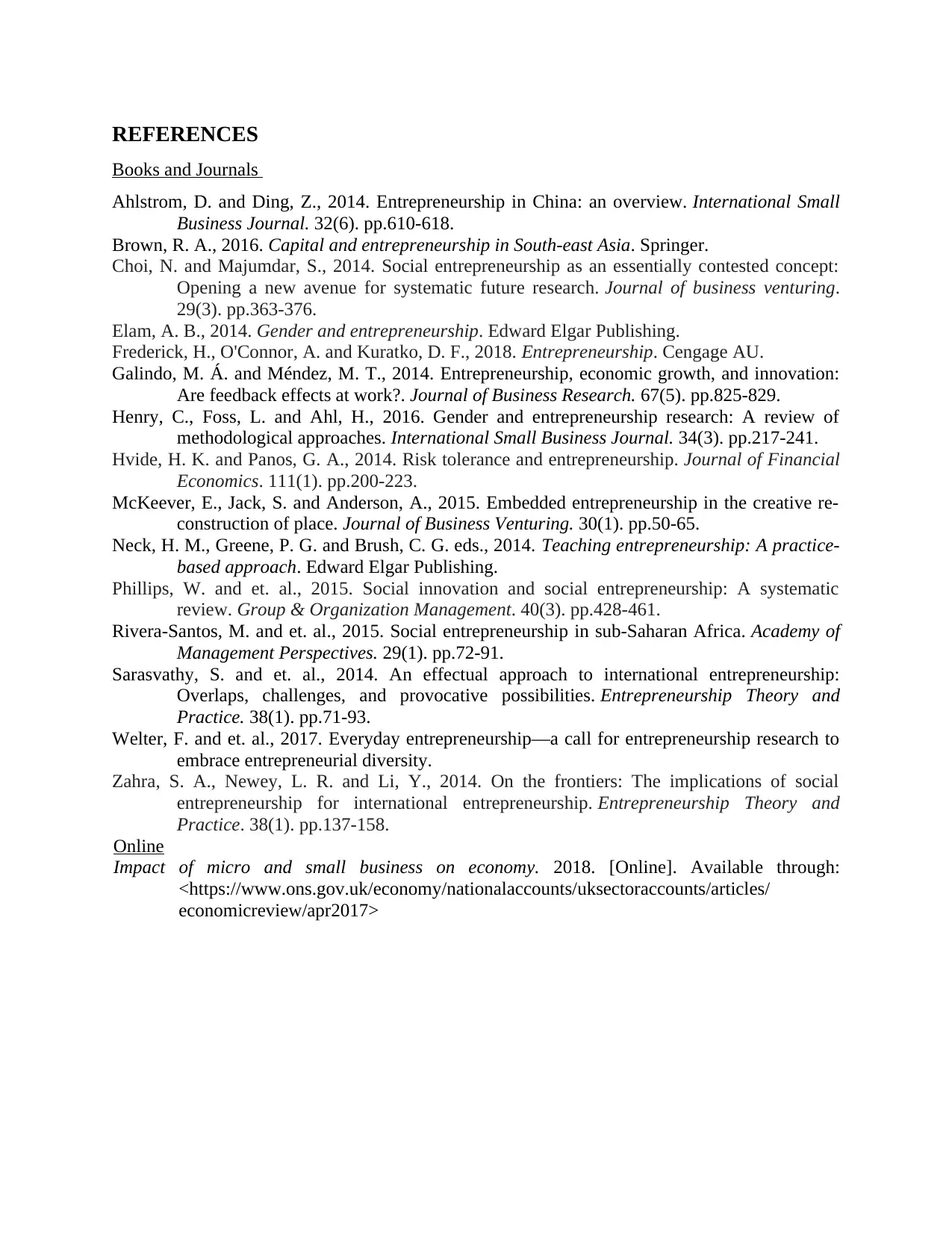
REFERENCES
Books and Journals
Ahlstrom, D. and Ding, Z., 2014. Entrepreneurship in China: an overview. International Small
Business Journal. 32(6). pp.610-618.
Brown, R. A., 2016. Capital and entrepreneurship in South-east Asia. Springer.
Choi, N. and Majumdar, S., 2014. Social entrepreneurship as an essentially contested concept:
Opening a new avenue for systematic future research. Journal of business venturing.
29(3). pp.363-376.
Elam, A. B., 2014. Gender and entrepreneurship. Edward Elgar Publishing.
Frederick, H., O'Connor, A. and Kuratko, D. F., 2018. Entrepreneurship. Cengage AU.
Galindo, M. Á. and Méndez, M. T., 2014. Entrepreneurship, economic growth, and innovation:
Are feedback effects at work?. Journal of Business Research. 67(5). pp.825-829.
Henry, C., Foss, L. and Ahl, H., 2016. Gender and entrepreneurship research: A review of
methodological approaches. International Small Business Journal. 34(3). pp.217-241.
Hvide, H. K. and Panos, G. A., 2014. Risk tolerance and entrepreneurship. Journal of Financial
Economics. 111(1). pp.200-223.
McKeever, E., Jack, S. and Anderson, A., 2015. Embedded entrepreneurship in the creative re-
construction of place. Journal of Business Venturing. 30(1). pp.50-65.
Neck, H. M., Greene, P. G. and Brush, C. G. eds., 2014. Teaching entrepreneurship: A practice-
based approach. Edward Elgar Publishing.
Phillips, W. and et. al., 2015. Social innovation and social entrepreneurship: A systematic
review. Group & Organization Management. 40(3). pp.428-461.
Rivera-Santos, M. and et. al., 2015. Social entrepreneurship in sub-Saharan Africa. Academy of
Management Perspectives. 29(1). pp.72-91.
Sarasvathy, S. and et. al., 2014. An effectual approach to international entrepreneurship:
Overlaps, challenges, and provocative possibilities. Entrepreneurship Theory and
Practice. 38(1). pp.71-93.
Welter, F. and et. al., 2017. Everyday entrepreneurship—a call for entrepreneurship research to
embrace entrepreneurial diversity.
Zahra, S. A., Newey, L. R. and Li, Y., 2014. On the frontiers: The implications of social
entrepreneurship for international entrepreneurship. Entrepreneurship Theory and
Practice. 38(1). pp.137-158.
Online
Impact of micro and small business on economy. 2018. [Online]. Available through:
<https://www.ons.gov.uk/economy/nationalaccounts/uksectoraccounts/articles/
economicreview/apr2017>
Books and Journals
Ahlstrom, D. and Ding, Z., 2014. Entrepreneurship in China: an overview. International Small
Business Journal. 32(6). pp.610-618.
Brown, R. A., 2016. Capital and entrepreneurship in South-east Asia. Springer.
Choi, N. and Majumdar, S., 2014. Social entrepreneurship as an essentially contested concept:
Opening a new avenue for systematic future research. Journal of business venturing.
29(3). pp.363-376.
Elam, A. B., 2014. Gender and entrepreneurship. Edward Elgar Publishing.
Frederick, H., O'Connor, A. and Kuratko, D. F., 2018. Entrepreneurship. Cengage AU.
Galindo, M. Á. and Méndez, M. T., 2014. Entrepreneurship, economic growth, and innovation:
Are feedback effects at work?. Journal of Business Research. 67(5). pp.825-829.
Henry, C., Foss, L. and Ahl, H., 2016. Gender and entrepreneurship research: A review of
methodological approaches. International Small Business Journal. 34(3). pp.217-241.
Hvide, H. K. and Panos, G. A., 2014. Risk tolerance and entrepreneurship. Journal of Financial
Economics. 111(1). pp.200-223.
McKeever, E., Jack, S. and Anderson, A., 2015. Embedded entrepreneurship in the creative re-
construction of place. Journal of Business Venturing. 30(1). pp.50-65.
Neck, H. M., Greene, P. G. and Brush, C. G. eds., 2014. Teaching entrepreneurship: A practice-
based approach. Edward Elgar Publishing.
Phillips, W. and et. al., 2015. Social innovation and social entrepreneurship: A systematic
review. Group & Organization Management. 40(3). pp.428-461.
Rivera-Santos, M. and et. al., 2015. Social entrepreneurship in sub-Saharan Africa. Academy of
Management Perspectives. 29(1). pp.72-91.
Sarasvathy, S. and et. al., 2014. An effectual approach to international entrepreneurship:
Overlaps, challenges, and provocative possibilities. Entrepreneurship Theory and
Practice. 38(1). pp.71-93.
Welter, F. and et. al., 2017. Everyday entrepreneurship—a call for entrepreneurship research to
embrace entrepreneurial diversity.
Zahra, S. A., Newey, L. R. and Li, Y., 2014. On the frontiers: The implications of social
entrepreneurship for international entrepreneurship. Entrepreneurship Theory and
Practice. 38(1). pp.137-158.
Online
Impact of micro and small business on economy. 2018. [Online]. Available through:
<https://www.ons.gov.uk/economy/nationalaccounts/uksectoraccounts/articles/
economicreview/apr2017>

1 out of 13
Related Documents
Your All-in-One AI-Powered Toolkit for Academic Success.
+13062052269
info@desklib.com
Available 24*7 on WhatsApp / Email
![[object Object]](/_next/static/media/star-bottom.7253800d.svg)
Unlock your academic potential
© 2024 | Zucol Services PVT LTD | All rights reserved.





